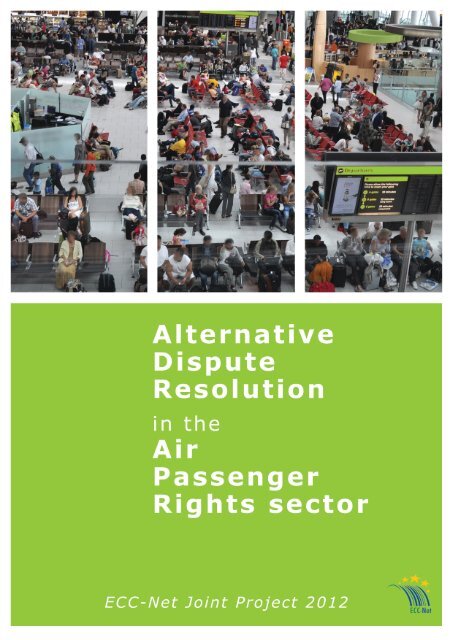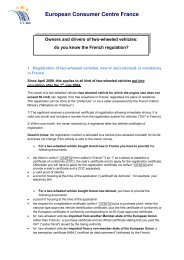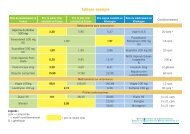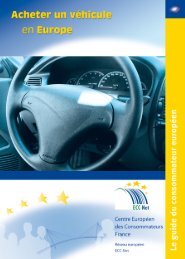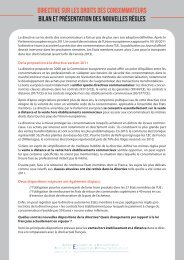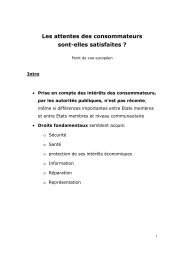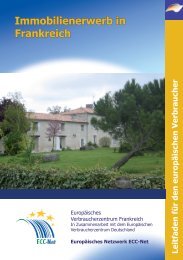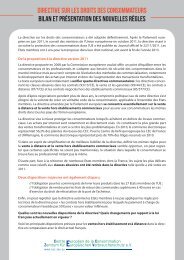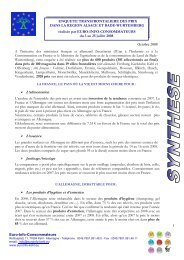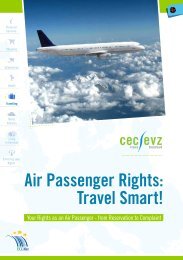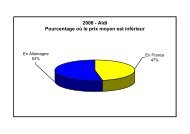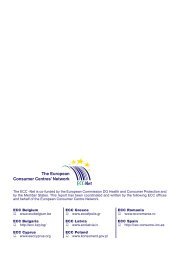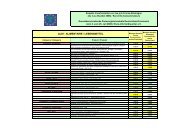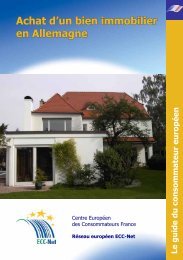Full report (pdf) - Centre Européen de la Consommation
Full report (pdf) - Centre Européen de la Consommation
Full report (pdf) - Centre Européen de la Consommation
- No tags were found...
You also want an ePaper? Increase the reach of your titles
YUMPU automatically turns print PDFs into web optimized ePapers that Google loves.
Introduction:The necessity and benefit of Alternative DisputeResolution (ADR) entities for consumer issuesis recognized today not only by consumerorganizations, national authorities and Europeaninstitutions, but increasingly in the business sector.There is no longer the need to e<strong>la</strong>borate onthe qualities of ADR, allowing consumers tofind a solution with a tra<strong>de</strong>r and avoiding courtprocedures: rapidity, low costs, simplicity, etc.Over the <strong>la</strong>st years, the ECC-Net has received asteadily increasing number of comp<strong>la</strong>ints in the airpassenger rights (APR) sector.The existence of a well-functioning ADR entitywould be a key for reaching a high number ofmutually satisfactory solutions. This <strong>report</strong> thereforeaims to establish a picture of the current situationregarding ADR in the air passenger rights sectorand to <strong>de</strong>velop recommendations.The ECC-Net’s involvement in APR:The EU-wi<strong>de</strong> network of European Consumer<strong>Centre</strong>s (ECC-Net) in its current form exists since2005. The network’s objective is to strengthen theconsumers’ trust in the single market. The networkis co-fun<strong>de</strong>d by the European Commission (EC) andthe Member States of the European Union (EU). Itis specialized in <strong>de</strong>aling with consumer requestsconcerning their rights within the EU and handlescross-bor<strong>de</strong>r consumer comp<strong>la</strong>ints. Transactionsin the APR sector are very often of a cross-bor<strong>de</strong>rnature and therefore at the heart of the network’sconcerns and activities. The ECC-Net also provi<strong>de</strong>sfeedback to national and EU stakehol<strong>de</strong>rs, based onpractical experience. Since 2005, basically since theMontreal Convention 1 and especially the entry intoforce of Regu<strong>la</strong>tion 261/2004 2 , the ECCs <strong>report</strong>edan increase in enquiries re<strong>la</strong>ted to APR and indifficulties of resolving comp<strong>la</strong>ints. Several <strong>report</strong>son this subject have been published 3 .The ECC-Net statistics, based on the internaldatabase “IT-Tool” managed by the EC, shows thatsince 2010 approximately 20% of the network’sactivities concern APR.2010 was a year marked by the volcanic eruptionin Ice<strong>la</strong>nd and the closure of the EU airspace. It wasalso a year of heavy snows in winter. 2012 was a yearmarked by many insolvency procedures. However,not all comp<strong>la</strong>ints in the APR sector are linked toexceptional circumstances.Nevertheless, the volcanic eruption in Ice<strong>la</strong>nd in2010 and the following ash crisis allowed a firstcomparison of comp<strong>la</strong>int handling by airlinesthroughout the EU, Ice<strong>la</strong>nd and Norway. Only31% of the cases handled by the ECC-Net could tobe settled amicably 4 . This exceptional event wastherefore a starting point for Member States to focuson the possibilities of ADR in this specific sector.Furthermore, several enforcement authorities aswell as airlines realized the necessity and benefitsof this comp<strong>la</strong>int-handling mechanism by creatingor cooperating with ADRs. In<strong>de</strong>ed, ADR bearsadvantages for all si<strong>de</strong>s; for consumers: a chance tofind a solution instead of giving up on a comp<strong>la</strong>intthey might have (entailing all the negative impactthis has on the confi<strong>de</strong>nce of consumers) or goingto court (entailing a lengthy and complicatedprocess); for airlines: being given the opportunityto <strong>de</strong>monstrate their interest in their customers’concerns ; for the enforcement authorities: being atthe heart of citizens’ concerns as well as ba<strong>la</strong>ncingbusiness interests.Air Passenger rights remain a hot spotUnfortunately, even though the ash cloud hasdissipated, air passenger rights remain a hot spotin cross-bor<strong>de</strong>r consumer comp<strong>la</strong>ints and thesolutions proposed by many airlines are not entirelysatisfactory as they do not take into account all thelegal provisions that should be applied (Montreal(1) Convention for the Unification of Certain Rules for InternationalCarriage by air, done at Montreal on 28 May 1999(2) Regu<strong>la</strong>tion (EC) No 261/2004 of the European European Parliamentand of the Council of the 11th of February 2004 establishing commonrules on compensation and assistance to passengers in the eventof <strong>de</strong>nied boarding and of cancel<strong>la</strong>tion or long <strong>de</strong><strong>la</strong>y of flights, andrepealing Regu<strong>la</strong>tion (EEC) No 295/91(3) Air Passengers Rights Report 2011 – “In the aftermath of theVolcanic Ash Crisis”, “Air Passenger Comp<strong>la</strong>ints Report 2006”, “AirPassenger Rights: Consumer Comp<strong>la</strong>ints 2005: A Summary & Analysisof Consumer Comp<strong>la</strong>ints <strong>report</strong>ed to the European Consumer <strong>Centre</strong>” :http://www.europe-consommateurs.eu/en/publications/ecc-net<strong>report</strong>s/(4) Air Passengers Rights Report 2011 – ”In the aftermath of the VolcanicAsh Crisis“: http://www.europe-consommateurs.eu/en/publications/ecc-net-<strong>report</strong>s/2
Convention, Regu<strong>la</strong>tion 261/2004, the Court ofJustice of the European Union (CJEU) “Sturgeon”,and “Nelson”, cases 5 ).On the occasion of the celebration of the “20 yearsof the EU single market”, passenger rights havebeen i<strong>de</strong>ntified as one of the challenges for thefuture: “<strong>de</strong>spite EU efforts to inform passengers ontheir rights and to monitor their enforcement, airpassenger rights are often not well respected”, 6 .Consumers therefore seek ways of redress otherthan the direct contact with an airline. The firstcourt cases are in progress, also the European smallc<strong>la</strong>ims procedure 7 is of help to some consumers 8 .However, most consumers continue to be reluctantto engage in a long judicial procedure and wouldprefer a simpler process arbitrated by an objectivethird party. The enforcement authorities are onlyof limited help as not all of them handle individualcomp<strong>la</strong>ints.// Aim of the studyThe ECC-Net, rich with 7 years of experience in crossbor<strong>de</strong>rconsumer issues, has therefore <strong>de</strong>ci<strong>de</strong>d toevaluate the current state of possibilities for ADR inthe APR sector.As a general remark, the ADR <strong>la</strong>ndscape variesconsi<strong>de</strong>rably from one country to another and hasnot yet reached its full potential, especially in theAPR sector.This study highlights the ADR entities avai<strong>la</strong>ble inthe APR sector all over the European Union, Ice<strong>la</strong>ndand Norway, compares practices and provi<strong>de</strong>ssuggestions to improve the system and to bettercoordinate ADR with other stakehol<strong>de</strong>rs: NationalEnforcement Bodies (NEB), ECC-Net, Europeaninstitutions, airlines and business from the travelsector and, of course, consumers.CJEU Nelson case confirms the previousSturgeon case <strong>la</strong>wA new <strong>de</strong>cision of the CJEU was given on the 23rdof October 2012 (“Nelson case”), confirming thecourt’s earlier jurisdiction in the “Sturgeon case”,stating that passengers whose flights are <strong>de</strong><strong>la</strong>yedmay be treated, for the purposes of the applicationof the right to compensation, as passengers whoseflights are cancelled. Therefore, they may rely onthe right to compensation <strong>la</strong>id down in Article 7 ofRegu<strong>la</strong>tion 261/2004 when they suffer, on accountof the flight <strong>de</strong><strong>la</strong>y, a loss of time of three hours ormore.This <strong>de</strong>cision is very welcomed by the ECC-Net asit confirms and strengthens the consumer’s rightto compensation when encountering flight <strong>de</strong><strong>la</strong>ys.This will hopefully lead to more consumers c<strong>la</strong>imingtheir rights, as the consumers’ confi<strong>de</strong>nce that acontact with the airline will prove successful, isstrengthened. In case the firts c<strong>la</strong>im is not treatedsatisfactorially, consumers may then turn to anADR to resolve the dispute and ultimately receivecompensation directly from the airline withoutentering into a legal conflict. Hopefully, theairline companies will also genuinely consi<strong>de</strong>r theconsumers’ comp<strong>la</strong>ints and promote the airlines’willingness to find an amicable solution out of court.(5) Judgment of the Court, 19 November 2009 in Joined Cases C-402/07Christopher Sturgeon and Others v Condor Flugdienst GmbH andC-432/07 Stefan Böck and Cornelia Lepuschitz v Air France SAand Judgment of the Court, 23 October 2012 in Joined Cases C-581/10Nelson and Others v Deutsche Lufthansa AG and C-629/10 TUI Trave<strong>la</strong>nd Others v Civil Aviation Authority(6) http://www.singlemarket20.eu/challenges/overview/disp<strong>la</strong>y?id=33(7) Regu<strong>la</strong>tion (EC) No 861/2007 of the European Parliament and of theCouncil of 11 July 2007 establishing a European small c<strong>la</strong>ims procedure(8) ECC-Net European Small C<strong>la</strong>ims Procedure Report, September 20123
Protocol of the study:ECC France and Germany were project lea<strong>de</strong>r of thisstudy and sent out a questionnaire to get as muchrelevant information as possible on ADR entities ineach Member State, Ice<strong>la</strong>nd and Norway, in or<strong>de</strong>rto compare the different characteristics.Participants : ECC Austria, Belgium, Bulgaria, CzechRepublic, Cyprus, Denmark, Estonia, Fin<strong>la</strong>nd, France,Germany, Greece, Hungary, Ice<strong>la</strong>nd, Ire<strong>la</strong>nd, Italy,Latvia, Lithuania, Luxemburg, Malta, Norway, Portugal,Po<strong>la</strong>nd, Romania, Slovakia, Spain, Swe<strong>de</strong>n, TheNether<strong>la</strong>nds, United Kingdom.• Proposed Directive on consumer ADR foreffective, impartial and transparent ADRentities for all kinds of consumer disputes• Proposed Regu<strong>la</strong>tion on consumer ODR- online p<strong>la</strong>tform for resolving consumerdisputes about online purchases in anotherEU country// Abbreviations:ADR = Alternative Dispute ResolutionAPR = Air Passenger RightsCAA = Civil Aviation AuthorityCJEU= Court of Justice of the European UnionEC = European CommissionECC = European Consumer <strong>Centre</strong> (ECC-Net)NEB = National Enforcement BodyODR = Online Dispute Resolution// Legal texts:• Regu<strong>la</strong>tion (EC) No 261/2004 of theEuropean Parliament and of the Council of 11February 2004 establishing common rules oncompensation and assistance to passengers inthe event of <strong>de</strong>nied boarding and of cancel<strong>la</strong>tionor long <strong>de</strong><strong>la</strong>y of flights, and repealing Regu<strong>la</strong>tion(EEC) No 295/91• Convention for the Unification of Certain Rulesfor International Carriage by Air (the MontrealConvention), 28 May 1999• Regu<strong>la</strong>tion (EC) No 2027/97 of 9 October 1997on air carrier liability in the event of acci<strong>de</strong>nts• Judgment of the Court, 19 November 2009 inJoined Cases C-402/07 and C-432/07 (“Sturgeoncase”)• Judgment of the Court, 23 October 2012 inJoined Cases C-581/10 Nelson and Others vDeutsche Lufthansa AG and C-629/10 TUI Trave<strong>la</strong>nd Others v Civil Aviation Authority4
In<strong>de</strong>x:1. ADR entities in the European Union, Ice<strong>la</strong>nd and Norway 61.1 . Different types of ADR entities … if an ADR exists to handle APR cases! 61.2. Area of intervention in APR cases 91.3. Creation of ADR entities and financing of the system 101.4. Notification of ADR 111.5. ADR and/or NEB 111.6. Tra<strong>de</strong>rs’ participation in the ADR procedure 122. Relevant aspects of the procedures of the various existing ADR entities in the APR sector 142.1. Existence of written rules and basic principles of the ADR procedure 142.2. Language and trans<strong>la</strong>tion 162.3. Participation of ECCs in the ADR process 172.4 Binding aspect of <strong>de</strong>cisions 173. Recommendations regarding ADR in the APR sector and best practices 204. List of ECCs 22This <strong>report</strong> arises from the project European Consumer<strong>Centre</strong>s’ Network – ECC-Net, which has receivedfunding from the European Union and the MemberStates, in the frame of the Program of Communityaction in the field of Consumer policy for 2007-13. The<strong>report</strong> may contain opinions that do not necessarilyreflect those of the European Commission/EAHC ornational funding bodies.co-fun<strong>de</strong>d by theJanuary 20135
1. ADR schemes in the European Union, Ice<strong>la</strong>nd and NorwayThe first result of this study reveals that there is no common ADR scheme in the APR sector within theEuropean Union, Ice<strong>la</strong>nd and Norway. As in other consumption sectors, the setup of ADR <strong>de</strong>pends onthe national context of each country, established in accordance with its own habits, administrativeorganization, consumer representation schemes, etc.This study tries to outline the major trends to be observed when looking at the different ADRs existing inthe APR sector.1.1. Different types of ADR schemes if an ADR exists to handle APR casesLIST OF ADR FOR APRClick on the Europe map to reveal each ADR’saddress per country.
- - - - - - - - - - - - - - - - - - - - - - - - - - - - - - - - - - - - - - - - - - - - - - -• Countries with no ADR existing:• Some countries do not have an ADR able tohandle APR cases:• These countries are Austria, Bulgaria, Ire<strong>la</strong>nd,Romania, Slovakia, the United Kingdom, andsince the 1st January 2012, the Nether<strong>la</strong>nds asthe Consumer Comp<strong>la</strong>int Board for Aviationstopped its activity (see box 1).Consequently, in these countries, consumersdo not have any access to an ADR entity in theAPR sector. If they have a comp<strong>la</strong>int, they willhave to turn directly to the company or invoke acourt procedure to try and enforce their passengerrights.• ADR with a general competence (not solely for APRor travel cases)• Many EU countries as well as Ice<strong>la</strong>nd have anADR entity with a general competence whichtherefore also inclu<strong>de</strong>s disputes concerning APR(Czech Republic, Cyprus, Denmark (ConsumerComp<strong>la</strong>ints Board), Estonia, Fin<strong>la</strong>nd, Germany(Online-Schlichter), Greece, Hungary, Italy with“RisolviOnline”, Latvia, Lithuania, Malta, Portugal,Po<strong>la</strong>nd and Spain).• In Swe<strong>de</strong>n, even though the consumer mustturn to a general ADR entity which can intervenein any consumer sector, the ADR provi<strong>de</strong>sa specific travel <strong>de</strong>partment, handling travelre<strong>la</strong>ted cases including APR cases.• In Germany (Online-Schlichter), Hungary, Spainand Portugal, the competence of the ADR entityis limited to a specific region.• In some cases its competence <strong>de</strong>pends onthe value of the comp<strong>la</strong>int (Cyprus, Denmark(Consumer Comp<strong>la</strong>ints Board) and Portugal).The competence of the CACCL (Centro <strong>de</strong> Arbitragem<strong>de</strong> Conflitos <strong>de</strong> Consumo <strong>de</strong> Lisboa), forexample, is limited to the Lisbon district and toconsumer comp<strong>la</strong>ints of un<strong>de</strong>r 5000 € (there isalso a national arbritation centre, whose territorialcompetence covers the regions in the main<strong>la</strong>ndand Azores Autonomous Region wherethere is no other competent arbritation center).The Danish Consumer Comp<strong>la</strong>ints Board is empoweredto hear comp<strong>la</strong>ints re<strong>la</strong>ting to goodsor services that cost at least DKK 80 (approx. 105€). The upper limit for all cases is DKK 100 000(approx. 13 400 €).• The value of comp<strong>la</strong>int must not exceed 3000 €in Cyprus and 30000 € in Germany (SöP).NL: Functioning of the former Comp<strong>la</strong>intBoard for APR c<strong>la</strong>ims in The Nether<strong>la</strong>ndsOn January 1st 2012, the activity of the Consumer Comp<strong>la</strong>intBoard for Aviation stopped its activity due to the Dutch Boardof Airline representatives (BARIN) withdrawing its cooperation.This ADR was notified with the European Commission an<strong>de</strong>very member of BARIN was participating in the ADR process,even the low cost airlines. The Comp<strong>la</strong>int Board worked witha Commission of which half of the representatives wereconsumers and the other half consisted of representatives fromairlines.The ADR <strong>de</strong>cision was binding for the companies.The board published several of its <strong>de</strong>cisions, guaranteeing thatthe parties remain anonymous.The role of this Comp<strong>la</strong>int Board was distinct from the role ofthe NEB.Restrictions: this procedure was not free of charge forconsumers and the competence was limited to flights leavingfrom a Dutch airport.- - - - - - - - - - - - - - - - - - - - - - - - - - - - - - - - - - - - - - - - - - - - - -Example of a specific ADR for APR c<strong>la</strong>ims:Flyk<strong>la</strong>genemnda in NorwayNorway is one of the only countries to have a specificADR for air passenger c<strong>la</strong>ims, competent for disputes re<strong>la</strong>ting toscheduled air traffic. However, it can also handle c<strong>la</strong>ims againsttravel agencies or airports if they are linked to the applicationof the EU Regu<strong>la</strong>tion 261/2004. This ADR was established by apublic initiative and is notified with the European Commission.The Board is financed by a fee imposed by the Ministryof Transport, which is paid by all airlines operating fromNorwegian airports. In 2009, the fee was 0,20 NOK (approx.0.03 €) per passenger travelling from a Norwegian airport. Theprocedure is free for consumers.The airlines participate in the procedure. The consumer invokesthe procedure with his c<strong>la</strong>im; the secretary of the Board asksfor the airline’s position. The answer is communicated to theconsumer for comments and then the whole file is submitted tothe Board for a <strong>de</strong>cision, which will be communicated to eachparty. The <strong>de</strong>cision is not binding for the airline but in case theairline does not adhere to it, the case is published in a specificsection on the Board’s website.During the procedure, in or<strong>de</strong>r to complete the file beforecoming to a <strong>de</strong>cision, the ADR can benefit from the expertiseand cooperation of the NEB (CAA) in Norway.- - - - - - - - - - - - - - - - - - - - - - - - - - - - - - - - - - - - - - - - - - - - - -Example of an ADR set by an airline:Alitalia’s mediatorThis is the only example among all of the European airlinesin which a company has set up a Mediation service for itscustomers.Alitalia has signed a comp<strong>la</strong>int handling protocol with the majorItalian consumer associations. The conciliation is managed bythe signatory consumer associations and the airline.With the help of the ECC Italy, the scheme has been improvedover the years. Even if the issue raised concerning thein<strong>de</strong>pen<strong>de</strong>nce of the scheme has not yet been completelyc<strong>la</strong>rified, the ADR has <strong>de</strong>monstrated its genuineness and effortin regard to the handling of cases and in helping consumersfind amicable solutions in cases where the customer service hasgiven a negative answer to the consumer or has not answeredthe consumer’s comp<strong>la</strong>int within a pre-established time limit.Advantage: transparency for the consumer by the written rulesof procedure and amicable settlements even if no legis<strong>la</strong>tiveprovisions are applicable to the case.Disadvantage: third part missing7- - - - - - - - - - - - - - - - - - - - - - - - - - - - - - - - - - - - - - - - - - - - - -
• ADR entities specific for the travelsector or Air Passenger rights disputes:Only two countries have an ADR entityspecifically <strong>de</strong>dicated to handlingc<strong>la</strong>ims in the Air Passenger Rights sector.Norway provi<strong>de</strong>s an ADR which is exclusivelycompetent in APR (see box 2). In Italy, an ADRfor APR c<strong>la</strong>ims exists, but it can handle disputesonly against Alitalia as this Conciliation Boardwas established by this Italian airline (see box 3).In France, a service of the CAA offers a kind ofinformal ADR entity to passengers.• In six countries, ADR entities, specialized in thetravel sector, have been set up and are alsocompetent to handle c<strong>la</strong>ims involving APR (Belgium,Denmark (Danish Travel Industry Comp<strong>la</strong>intsBoard), France, Germany (SöP), Ice<strong>la</strong>ndand Luxemburg). Nevertheless, specific requirementsmust be met:• In Belgium, the ADR can only intervene in disputesre<strong>la</strong>ting to package holidays, includingthe disputes involving transport services whichare part of the package. However, the ADR cannotintervene in cases concerning the purchaseof flight-only services. In Denmark, the DanishTravel Industry Comp<strong>la</strong>ints Board handles comp<strong>la</strong>intsregarding package holidays and transportservices <strong>de</strong>parting from Denmark and soldby a company based in Denmark. The ADR cannot intervene regarding flight-only cases. Forflight-only comp<strong>la</strong>ints, it is the competence ofthe general Consumer Comp<strong>la</strong>ints Board.• The CLLV (Commission Luxembourgeoise <strong>de</strong>sLitiges Voyage) in Luxemburg can handle bothpackage holidays and flight-only comp<strong>la</strong>ints.• In Germany, the SöP (Conciliation Body for PublicTransport) can handle disputes of consumersin the whole transport sector: rail, ship, busand flights.• In Ice<strong>la</strong>nd, and very recently in France (sinceJanuary 2012), an ADR was created in the travelsector that inclu<strong>de</strong>s APR. However, these ADRscan intervene only if the air carrier is a memberof the tra<strong>de</strong> associations having set up the ADR.For example in France, the MTV (Médiation Tourismeet Voyage) can handle c<strong>la</strong>ims against AirFrance as the airline adhered to the ADR entity,but it cannot handle c<strong>la</strong>ims against any foreignairline as none of them is a member of this ADRentity.- - - - - - - - - - - - - - - - - - - - - - - - - - - - - - - - - - - - - - - - - - - - - - -FR : La Médiation Tourisme et Voyage in FranceThree fe<strong>de</strong>rations of the tourism sector <strong>de</strong>ci<strong>de</strong>d, in 2011, to setup a common ADR service. The Fe<strong>de</strong>ration of travel agencies,tour operators and air carriers consulted with representativesfrom consumer associations, including the ECC France.Members of the fe<strong>de</strong>rations are committed to the ADR, sothey must answer the ADR’s questions and requests that arenecessary to handle a case and to make a <strong>de</strong>cision. The ADRcan also handle c<strong>la</strong>ims against tra<strong>de</strong>rs who are not part of oneof the fe<strong>de</strong>rations, but only if this tra<strong>de</strong>r voluntary accepts theADR process.The <strong>de</strong>cision is not officially binding, although there is a moralcommitment for the fe<strong>de</strong>ration to adhere to the <strong>de</strong>cision. TheADR is financed by the fe<strong>de</strong>rations; the procedure is free forconsumers.- - - - - - - - - - - - - - - - - - - - - - - - - - - - - - - - - - - - - - - - - - - - - -SE : Allmänna rek<strong>la</strong>mationsnämn<strong>de</strong>n (ARN) in Swe<strong>de</strong>nThis public ADR with a general competence can handleany consumer c<strong>la</strong>im (from banking to motor vehicles). Theoriginality of this general ADR, however, lies in the specific 13<strong>de</strong>partments. The travel <strong>de</strong>partment inclu<strong>de</strong>s APR. The rolesof this general ADR and the NEB are clearly distinct as the NEBcannot handle individual cases. The cases are evaluated by aspecialized board, which is composed of both consumers andtra<strong>de</strong>rs. The ECC Swe<strong>de</strong>n cooperates with the ADR, transferringcases to this authority as well as occasionally participating on theboard as a representative for consumers or as an expert in casesthe ECC has not been the refering party. The recommandationis not binding, but usually followed. Decisions will be publishedanonymously but every interested party can ask for a copy ofthe full <strong>de</strong>cision.- - - - - - - - - - - - - - - - - - - - - - - - - - - - - - - - - - - - - - - - - - - - - -8
1.2. Area of intervention in APR casesIt appears to the ECC-Net that, in general, eventhough the ADR is not specifically specialized inAPR, any case based on Regu<strong>la</strong>tion 261/2004, theMontreal convention or the “Sturgeon” case <strong>la</strong>wshould be <strong>de</strong>alt with. However, some ADRs haverestrictions concerning the legal sources they canapply.Also, <strong>de</strong>pending on the ADR entity, the ADR willeither base its <strong>de</strong>cision process exclusively on thelegal texts and examine whether the tra<strong>de</strong>r has correctlyimplemented relevant APR legis<strong>la</strong>tion, or itwill additionally take into account other ADR principlessuch as fairness and equity.compromise which might not meet the compensationor refund limits, provi<strong>de</strong>d for in the legal texts,to the full extent. The ADR is not meant to enforcethe texts, the text are a basis for negotiation in or<strong>de</strong>rto find a solution acceptable to both parties.In most countries, ADRs apply all, for the consumers’comp<strong>la</strong>int relevant legal texts (Cyprus, Estonia, Fin<strong>la</strong>nd,France, Germany, Hungary, Ice<strong>la</strong>nd, Italy, Lithuania,Luxemburg, Norway, Portugal, Spain andSwe<strong>de</strong>n). The following table shows which specificAPR legal basis the ADR in Latvia and Denmark willnot consi<strong>de</strong>r.For example, the French ADR can handle cases inwhich the relevant APR legal texts were not appliedby the airline. For the ADR <strong>de</strong>cision, however, it wil<strong>la</strong>lso take into account equity in or<strong>de</strong>r to propose aLegis<strong>la</strong>tion not taken inot account by ADRsCountriesAPR source not applied by ADRDenmark: Both ADRs (general ADR and DanishTravel Industry Comp<strong>la</strong>ints Board travel ADR)intervene only on the basis of a breach of contractbut can base their <strong>de</strong>cision on the Montrealconvention.Latvia: Legal provisions can only be implementedby the national courts. CRPC consi<strong>de</strong>rs onlyRegu<strong>la</strong>tion 261/2004. CRPC cannot give a<strong>de</strong>cision (which could then be binding for tra<strong>de</strong>rs)but only assists consumers by informing them onpassenger rights and further possible actions,and by receiving the airline’s exp<strong>la</strong>nations anddocumentary evi<strong>de</strong>nce. CRPC only informs thetra<strong>de</strong>r and the consumer of the consumer’spossibility to file a comp<strong>la</strong>int, its legal basis andthe possibility that the consumer might succeedin a court case.Regu<strong>la</strong>tion 261/2004 (<strong>de</strong>alt with by the DanishTransport Authority) but <strong>de</strong><strong>la</strong>y and cancel<strong>la</strong>tionmay also constitute a breach of contract.Montreal Convention and “Sturgeon”and “Nelson” case <strong>la</strong>w9
ADR entitiesand financing:1.3. Creation of ADR entities and financingof the systemOn which initiative the ADR entity was created andits funding is quite relevant in un<strong>de</strong>rstanding whycertain countries propose ADR entities with a generalcompetence and others offer specialized ADRs.It also allows for a better un<strong>de</strong>rstanding of the <strong>de</strong>cision-findingprocess.10Usually ADRs with a general competence were createdby a public initiative (Ministry, public services,etc.) and specialized ADRs are normally and initiallyformed by a private initiative (from tra<strong>de</strong>rs and/orconsumers associations) with occasional supportfrom public authorities to maintain the service andto guarantee its efficiency or in<strong>de</strong>pen<strong>de</strong>nce.
1.4. Notification of an ADRThe European Commission has drawn up a list(http://ec.europa.eu/consumers/redress_cons/schemes_en.htm) of all the ADRs in everyconsumption sector that have been notified bythe Member States as being in conformity with theCommission’s Recommendations 98/257/EC 9 and2001/310/EC 10 and therefore respect the followingcriteria:››In<strong>de</strong>pen<strong>de</strong>nce››Impartiality››Transparency››Adversarial principle››Effectiveness››Legality››Liberty››Principle of representation››FairnessBeing part of the main ADR entities in their respectivecountries, the ADRs with a general competenceare usually notified to the European Commissionas being in conformity with the above mentionedrecommendations.There is one exception: Cyprus has not yet notifiedits ADR to the Commission as it was created onlyrecently.Regarding specialized ADRs for the travel sectoror APR, the Alitalia’s Conciliation Board and theIce<strong>la</strong>ndic ADR are not notified.Nevertheless, the ECCs Italy and Ice<strong>la</strong>nd work withthem on a regu<strong>la</strong>r basis as these ADRs respect theEU recommendations on ADR. According to ECCIce<strong>la</strong>nd, the Ice<strong>la</strong>ndic ADR would only need to makeminor changes in or<strong>de</strong>r to be notified.The ADR set up by Alitalia is, for the moment,consi<strong>de</strong>red an experimental ADR by the ECC Italyand the DG SANCO.In France, the MTV is not yet notified as it isoperational since a few months only and it cannotbe examined yet as to whether or not the EuropeanCommission Recommendations are complied with.Besi<strong>de</strong> the above mentioned exceptions, all theother ADRs coming from private initiatives arenotified.1.5. ADR and/or NEB ?Article 16 of Regu<strong>la</strong>tion 261/2004 obligates eachMember State to <strong>de</strong>signate a “body responsible forthe enforcement of this regu<strong>la</strong>tion ” 11 .The European Commission has published a listof these National Enforcement Bodies (NEB),nominated by each Member State of the EuropeanUnion, Ice<strong>la</strong>nd, Norway (and Switzer<strong>la</strong>nd),which have the power to enforce the Regu<strong>la</strong>tion261/2004 12 .Generally, Member States <strong>de</strong>signate the NationalCivil Aviation Authority (CAA) as NEB. In accordancewith the national administration organization or themission given to the NEB, some of these bodies areable to handle and to enforce cases individually (forexample in Denmark). In other countries, the NEB isentitled to intervene only on behalf of a commoninterest and to enforce the Regu<strong>la</strong>tion according tothis common objective only.The situation appears to be quite confusing forpassengers when the NEB also offers a kind of ADRservice for individual c<strong>la</strong>ims such as the French NEB(DGAC) or when the ADR is also able to enforce theRegu<strong>la</strong>tion, such as CRPC in Latvia.In France, the DGAC (Civil Aviation Authority) was<strong>de</strong>signated as NEB. According to its mission as NEB,it has the power to enforce the Regu<strong>la</strong>tion and tosanction companies. Therefore, the DGAC can onlyintervene in the general interest of passengers andcannot enforce individual disputes. But the DGAChas also <strong>de</strong>veloped an ADR service which is able tohandle individual c<strong>la</strong>ims but strictly on an amicableground and solely to help consumers receive an(9) 98/257/EC: Commission Recommendation of 30 March 1998 onthe principles applicable to the bodies responsible for out-of-courtsettlement of consumer disputes(10) 2001/31/EC Commission Recommendation of 4 April 2001 on theprinciples for out-of-court bodies involved in the consensual resolutionof consumer disputes(11) Each Member State shall <strong>de</strong>signate a body responsible for theenforcement of this Regu<strong>la</strong>tion as regards flights from airports situatedon its territory and flights from a third country to such airports. Whereappropriate, this body shall take the measures necessary to ensure thatthe rights of passengers are respected. The Member States shall informthe Commission of the body that has been <strong>de</strong>signated in accordancewith this paragraph.(12)http://ec.europa.eu/transport/themes/passengers/air/doc/2004_261_national_enforcement_bodies.<strong>pdf</strong>11
answer from airlines concerning their c<strong>la</strong>im. TheDGAC, as ADR, does not propose dispute solutionsor confirm the proper application of the Regu<strong>la</strong>tion.For consumers, the distinction between thedifferent roles of the DGAC is not always clear: whencontacting the DGAC, consumers always hope toget an individual enforcement of their c<strong>la</strong>im and donot un<strong>de</strong>rstand the answers they receive, which arebased on an amicable intervention.Fin<strong>la</strong>nd is quite an exception in the ADR <strong>la</strong>ndscape.It is the only country in which there is a general ADRcompetent for APR but which is also <strong>de</strong>signated asa NEB.The tasks of the NEB in Fin<strong>la</strong>nd are divi<strong>de</strong>d between3 stakehol<strong>de</strong>rs:• Consumer AgencyThe Consumer Agency supervises compliancewith consumer protection legis<strong>la</strong>tion andconsumer rights in general. The ConsumerAgency supervises, among other things,the marketing and contract terms of airlinesoperating in Fin<strong>la</strong>nd. The Agency does notprocess individual disputes.• Consumer Disputes BoardThe Board issues recommendations concerningindividual disputes in Fin<strong>la</strong>nd. But the ADR doesnot have the possibility to sanction airlines - thatis in the hands of the Consumer Agency onlyand for the purposes of collective consumerprotection.• Finnish Transport Safety Agency (Trafi)Trafi is responsible for supervising safety in airtransport.1.6. Tra<strong>de</strong>rs participation in the ADRprocedureParticipation of Tra<strong>de</strong>rs in the ADR procedure:One of the basic principles of ADR comprises thatit is based on the good will of both parties - consumersand tra<strong>de</strong>rs - to cooperate in finding an amicablesolution to a dispute. The recourse to ADR is,in principle, not mandatory.In some ADR entities, however, the tra<strong>de</strong>rs havefreely submitted themselves to the possibility of anADR and have agreed to participate in any ADR procedureinitiated by a consumer.In six countries, respectively Denmark (ConsumersComp<strong>la</strong>ints Board), Fin<strong>la</strong>nd, Latvia, Lithuania,Norway and Swe<strong>de</strong>n, the ADRs competence to ruleis not <strong>de</strong>pen<strong>de</strong>nt on the tra<strong>de</strong>r’s acceptance to submitto an ADR procedure.The participation of the tra<strong>de</strong>rs in the ADR entitiesseems to be closely linked to the origin ofthe scheme, but also to its financing (see 1.3). Forexample, in Belgium, Ice<strong>la</strong>nd and Luxemburg, theADR entities were first initiated by a private initiativeof travel agencies, not the national airlines. Therefore,only the travel agencies or tour operatorshave agreed to participate in these schemes, whichare also partially financed by these tra<strong>de</strong>rs.In the case of Alitalia’s Conciliation Board as theADR was set up directly by the airline, the companyhas evi<strong>de</strong>ntly submitted to it and the competenceof the ADR is exclusively limited to cases involvingAlitalia (or an airline of the group).The French MTV was also created by a private initiativeof travel agencies and tour operator fe<strong>de</strong>rationsbut also by the association of French air carriers.Thus, nearly the whole travel sector participates inthis ADR entity and process.The German SöP normally can only handle comp<strong>la</strong>intsagainst its members but it could successfullyconciliate a number of cases with other airlines aswell. A current legis<strong>la</strong>tive proposal aims to ren<strong>de</strong>rparticipation in the conciliation procedure mandatoryfor all German airlines.12In most countries the ADRs <strong>de</strong>al with national companies.In Denmark for example the ADR (ConsumerComp<strong>la</strong>ints Board) can even handle comp<strong>la</strong>intsagainst foreign airlines.
Participation of tra<strong>de</strong>rs:13
2. Relevant aspects of the procedures of the various existing ADRentities in the APR sector2.1. Existence of written rules and basicprinciples of the ADR procedureA charter to organize the procedureAs most of the ADRs (general or specific) are notifiedto the European Commission, it is quite natural thatthese same ADRs have written rules of procedure ora legal text which organizes their activities and there<strong>la</strong>tion with the consumers. (This goes for Alitalia’sMediator as well).Costs and feesConcerning fees, the majority of ADR entities arefree of charge for consumers and tra<strong>de</strong>rs regardlessof the organizational background of the ADR. SomeADRs however ask for a fee from consumers, othersfrom tra<strong>de</strong>rs. In rare cases the procedure is withcosts for both parties.In the following countries the procedure is free ofcharge for consumers who will only bear their owncosts (copies, postal or communication fees, etc.):Czech Republic, Estonia, Fin<strong>la</strong>nd, France, Germany,Greece, Hungary, Italy (Alitalia), Latvia, Lithuania,Luxemburg, Norway, Portugal, Spain and Swe<strong>de</strong>n.In Belgium (50 € for conciliation/min. 100 € forarbitration) and Denmark (21 €/37 €) consumerswill have to pay a submission fee which will berecovered if the consumer wins the case or the caseis dismissed.In Italy (RisolviOnline) the consumer will have to paya fee <strong>de</strong>pending on the value of the c<strong>la</strong>im (startingat 25 €). The fee is due only if the tra<strong>de</strong>r accepts totake part in the proceeding.In Hungary there is no submission fee but theconsumer might pay justifiable costs of theproceeding if the case is lost.In Cyprus the consumer must pay a submission feebetween 5 to 17 € <strong>de</strong>pending on the c<strong>la</strong>im and if thecase is lost 85 to 170 € arbitrators fees, <strong>de</strong>pendingon the value of the comp<strong>la</strong>int.In Norway, only the tra<strong>de</strong>r has to pay a fee for themediation procedure (see box 3). In Ice<strong>la</strong>nd, wherethe ADR is initiated by a private initiative (consumerassociation and carrier fe<strong>de</strong>ration), both partieshave to pay a fee to participate in the procedure.Regarding Alitalia’s Conciliation Board, as it isinitiated by the airline, the costs are solely coveredby the airline.Type of procedure: Online Dispute Resolution (ODR) orhearingsMost of the ADRs provi<strong>de</strong> a distance procedure,especially for c<strong>la</strong>ims from foreign consumers.Usually, this is conclu<strong>de</strong>d in writing and the partiesdo not have to be present at a hearing. The ADR wil<strong>la</strong>sk each party to present its position regarding thec<strong>la</strong>im in or<strong>de</strong>r to form its opinion and to propose asolution. In some cases, the ADR will ask a third partyto present an expert’s opinion if this is necessary fora better evaluation of the case.In a few number of countries, a hearing is organizedto <strong>de</strong>al with the case in the presence of both parties.It can be observed that in these countries (Estonia,Hungary), the ADR has a general competence andwas initiated by public authorities and, in case aforeign consumer cannot be physically presentat the hearing, the ECC of these countries cangenerally help the consumer to be represented atthe hearing.Opportunity for an ADR to be provi<strong>de</strong>d with access toan expertiseMost of the ADR entities have the opportunity toseek expertise and/or expert opinions in or<strong>de</strong>rto propose an a<strong>de</strong>quate solution (except CzechRepublic, Fin<strong>la</strong>nd, Germany (Online-Schlichter), Italy(Alitalia), Luxemburg, Po<strong>la</strong>nd, Spain and Swe<strong>de</strong>n).Mostly, an external organization (meaning that it isnot an internal service of the ADR or of the tra<strong>de</strong>r)is commissioned with the expertise. This is the casefor the ADR in Cyprus, Denmark, Estonia, Latvia,Portugal and Norway. Often the ADR can contactthe National Civil Aviation Body or the NEB to receivethe analysis of an expert (for example in Denmark(Consumer Comp<strong>la</strong>ints Board) and Norway).The Latvian CRPC can even seek an opinion or14
Average duration of case handling:(duration is <strong>de</strong>pending, for exemple, on thecomplexity of the case)information from any competent body also abroad.In France, the MTV will ask the carrier for an expertise,which will not be communicated to the consumerbecause of a confi<strong>de</strong>ntiality agreement betweenthe ADR and the tra<strong>de</strong>rs. In Belgium as well, theCommission for Travel can ask the tour operatorsand travel agencies to provi<strong>de</strong> an expertise.Concerning the Alitalia’s Conciliation Board, theprocedure can be suspen<strong>de</strong>d to turn to the NEB foran expertise.Duration of case handlingThe Charters set by ADR entities foresee certainduration for the handling of the cases which aresubmitted for mediation or arbitration.-> see map aboveReport of activityMost of the ADR entities draft an annual <strong>report</strong>,providing statistics and the outcome of the work ofthe ADR.The <strong>de</strong>cisions of the ADRs are rarely published andif they are, the i<strong>de</strong>ntity of the parties will generallybe anonymized and the <strong>de</strong>cisions often publishedon the ADR’s website, not in the annual <strong>report</strong>.15
2.2. Language and trans<strong>la</strong>tionFor the majority of the ADRs, the written rulesof procedures do not foresee the possibility tosubmit a comp<strong>la</strong>int or to handle a case in any other<strong>la</strong>nguage than the official national <strong>la</strong>nguage(s).For a few ADRs, English can be an option for casesinvolving foreign consumers, or they even mayaccept several other <strong>la</strong>nguages, <strong>de</strong>pending on thehuman resources of the ADR.In Belgium, France, Germany (Online-Schlichter)Po<strong>la</strong>nd and Spain, the submission to the ADR canbe ma<strong>de</strong> exclusively in the national <strong>la</strong>nguage.In the Czech Republik, Cyprus, Estonia and Hungary,in principal, the ADR procedure will be in thenational <strong>la</strong>nguage, but some ADRs may acceptEnglish (or German as well for Hungary).In the following countries the ADR will accept thenational <strong>la</strong>nguage(s) and English: Italy (Alitalia),Latvia, Lithuania, Luxemburg, Portugal and Swe<strong>de</strong>n(if the tra<strong>de</strong>r accepts a submission in English).In Denmark, the Consumer Comp<strong>la</strong>ints Board mayaccept a case filed in English or a Scandinavian<strong>la</strong>nguage. The answer by the ADR, however, willonly be provi<strong>de</strong>d in Danish.For the SöP in Germany, the official <strong>la</strong>nguage isGerman, but the ADR can also handle cases inEnglish and requests in French.In Ice<strong>la</strong>nd Ice<strong>la</strong>ndic and any other <strong>la</strong>nguage agreedon with the ADR are possible.In Norway as well, the board may accept a case filedin English or a Scandinavian <strong>la</strong>nguage and theremight be a short summary of the <strong>de</strong>cision in Englishbut mostly, the ECC Norway will ensure that theconsumer ECC can un<strong>de</strong>rstand the ruling.Regarding possible trans<strong>la</strong>tions of the ADR<strong>de</strong>cisions or communications from the ADR intoother <strong>la</strong>nguages, only three ADRs are able to offerthis service.In Fin<strong>la</strong>nd, the <strong>la</strong>nguage of the ADR is Finnishand Swedish but in cases un<strong>de</strong>r Reg 261/2004,consumers can submit their comp<strong>la</strong>ints also inEnglish; in such cases, the rulings will also begivenin English.RisolviOnline, the general Italian ADR, establishedby the Mi<strong>la</strong>nese Chamber of Commerce, handlescases and provi<strong>de</strong>s answers to consumers in almostall EU <strong>la</strong>nguages, according to its procedural rules.Therefore ususally a trans<strong>la</strong>tion of the <strong>de</strong>cision isnot necessary.The Court of Arbitration in Portugal is able totrans<strong>la</strong>te its <strong>de</strong>cisions into English.So in most cases, a foreign consumer will beconfronted with a <strong>la</strong>nguage barrier in introducingor following his comp<strong>la</strong>int. Some ADRs exclusivelyaddress the <strong>de</strong>cision to the involved parties. Theconsumer will then receive a ruling in the <strong>la</strong>nguageof the ADR. The intervention of ECCs as facilitatorsin this process 13 is therefore very helpful andsmoothens the process.Linguistic case handling within the ECC-Net:Whenever a consumer has a cross-bor<strong>de</strong>r comp<strong>la</strong>int,he/she can turn to the ECC in his/her country ofresi<strong>de</strong>nce. The consumer ECC will examine the caseand once all the documentation has been provi<strong>de</strong>d,the case will be sent via the Intranet “IT-Tool” to thecountry of the tra<strong>de</strong>r. If applicable, the consumerECC will inclu<strong>de</strong> a legal analysis, based on thenational consumer protection rules. The tra<strong>de</strong>r ECCwill contact the tra<strong>de</strong>r or, if possible, send the caseto an ADR-body. Tra<strong>de</strong>r or ADR will be addressedin the tra<strong>de</strong>r country’s <strong>la</strong>nguage. Throughout theentire procedure, consumer and tra<strong>de</strong>r ECC remainat the disposal of the respective parties for furthercomments, enquiries or a follow-up of the case. Ifthe ADR ren<strong>de</strong>rs a <strong>de</strong>cision which is not in Englishor in the consumer’s <strong>la</strong>nguage, the tra<strong>de</strong>r ECCwill provi<strong>de</strong> at least a summary of the <strong>de</strong>cision inEnglish and the consumer ECC can trans<strong>la</strong>te it intothe consumer’s <strong>la</strong>nguage.(13) In accordance with art 6 of the proposal for a Regu<strong>la</strong>tion on ConsumerOnline Dispute resolution and art 11 of the proposal for consumerdisputes and amending Regu<strong>la</strong>tion n°2006/2004 and Directive 2009/22/EC(14) The Euroguichets were created in the early 1990s at the Commission’sinitiative in or<strong>de</strong>r to inform consumers about the possibilities of theinternal market and consumers’ rights.(15) Council Resolution of 25 May 2000 on a Community-wi<strong>de</strong> networkof national bodies for the extra-judicial settlement of consumer disputes16
2.3. Participation of ECCs in the ADRprocessThe current ECC-Net has been set up in 2005 by themerger of two existing networks: the network of theEuroguichets as information centres for consumers(since 1992 14 ) and the EEJ-Net, competent for out-ofcourtsettlements of consumer disputes, especiallyby promoting ADR (since 2001 15 ). The recourse toADR therefore is an integral part of the work of theECC-Net.The ECC-Net is co-financed, through grants, bythe Member States and the European Union. TheEU grants are provi<strong>de</strong>d on the basis of a grantagreement signed by the European Commissionand the host structures of the ECCs and approved bythe Member State’s authority. The grant agreementsinclu<strong>de</strong> a Va<strong>de</strong>mecum which sets out the globalobjectives of the ECC-Net.The objective 4 and 5 of the Va<strong>de</strong>mecum provi<strong>de</strong>that the ECCs help consumers with their disputeby <strong>de</strong>termining the appropriate ADR, giving all thenecessary information and assistance, allowing theconsumer to access an ADR and monitor the ADRprocess. ECCs should also contribute to promoteand <strong>de</strong>velop ADR in the Member States. In general,therefore, the ECCs work in cooperation with theADR entities. Especially if the ADR has a generalcompetence and can therefore handle manydifferent types of consumer disputes, an ECC canquite regu<strong>la</strong>rly transfer cases to that ADR.Some ECCs intervene more directly in the ADRprocedure. The ECC Swe<strong>de</strong>n, for example, can sit inon the ADR board as an expert, this, however, onlyin those cases in which the ECC Swe<strong>de</strong>n hasn’t beenthe referring part.The representative of the ECC Estonia can participatein the hearing of the cases transmitted by the ECCto the ADR. It can also help to complete the file inor<strong>de</strong>r to initiate the procedure.In Hungary, the ECC and the consumer arerepresented by the respective case handler at thehearing.2.4. Binding aspect of the <strong>de</strong>cisionsWhereas a consumer is always free to <strong>de</strong>ci<strong>de</strong>whether or not to accept the <strong>de</strong>cision of the ADRor to pursue the case in court, in some cases the<strong>de</strong>cision is binding for the tra<strong>de</strong>r.If the company does not follow the <strong>de</strong>cision or thenotice given by the ADR (binding or not), in somecountries it is possible to use this in court. If anADR’s <strong>de</strong>cision can be used in a court procedure, itbecomes part of the documentation of the file, butis, of course, not binding for the judge.In Cyprus and Portugal the <strong>de</strong>cision is bindingon both parties. The <strong>de</strong>cision by the ADR can beenforced as a court <strong>de</strong>cision.In Spain the <strong>de</strong>cision of the arbitration board hasthe same legal force as a court judgment.In Denmark the general ADR <strong>de</strong>cision will bepresented to the tra<strong>de</strong>r who has 30 days to complyor to inform the board in writing it will not. If thereis no information, the <strong>de</strong>cision is binding and canbe enforced by a bailiff. Non-compliance will resultin name and shame. Concerning the Danish TravelIndustry Comp<strong>la</strong>ints Board the <strong>de</strong>cision can beused in court, but the judge is not bound by it.(Concerning the Danish Travel Industry Comp<strong>la</strong>intsBoard the <strong>de</strong>cision can be used in court, but thejudge is not bound by it.)In both Italian ADRs as well as in Ice<strong>la</strong>nd, theproposal of a solution from the ADR is formalized ina protocol which is signed by both parties and thenconstitutes a contract between the parties. This canbe enforced in front of a court in case the companydoes not adhere to the agreement. In Norway, a<strong>de</strong>cision of the ADR has a strong impact and can beconsi<strong>de</strong>red as a source of <strong>la</strong>w by the judge.In Belgium, the arbritration <strong>de</strong>cision is binding onthe tra<strong>de</strong>r and no legal procedure is possible.In Estonia the <strong>de</strong>cision is not binding for the parties.If they do not agree with the <strong>de</strong>cision, they cantake the case to court. If the tra<strong>de</strong>r fails to complywith the ADR <strong>de</strong>cision, the name of the tra<strong>de</strong>r willbe published in the “b<strong>la</strong>ck list” on the ConsumerProtection Board homepage.17
Binding aspect of the <strong>de</strong>cisions:18
In Hungary, if the ADR’s <strong>de</strong>cision is only binding ifthe tra<strong>de</strong>r has notified the ADR entity, even before orduring the proceeding, that it accepts it as binding.If there is no such notification then the <strong>de</strong>cision isonly a recommendation. In case of non-complianceof a recommendation by the tra<strong>de</strong>r, the ADR entity -after the notification of the consumer - shall beentiteled to publish a brief <strong>de</strong>scription of the case -without the name of the consumer - and outcome,within 60 days of <strong>de</strong>livery of the <strong>de</strong>cision to thetra<strong>de</strong>r. In case of non-compliance of a binding<strong>de</strong>cision or compromise the consumer can ask thecourt to <strong>de</strong>c<strong>la</strong>re the <strong>de</strong>cision enforceable.In Fin<strong>la</strong>nd the <strong>de</strong>cision is a recommendationand therefore not binding but there is a strongincentive. The most significant <strong>de</strong>cisions arepublished without the names of the parties but aFinnish consumer organisation publishes a b<strong>la</strong>cklist. Information appears on this list about two yearsafter the case was submitted to the ADR.In Swe<strong>de</strong>n, the consumer magazine ”Råd & Rön”,owned by the Swedish consumer organisation, usesthe ADR <strong>de</strong>cision data to publish the names of thetra<strong>de</strong>rs not complying with the ARN <strong>de</strong>cision. This”b<strong>la</strong>ck list” is given wi<strong>de</strong> publicity in Swe<strong>de</strong>n andprovi<strong>de</strong>s a strong incentive for business compliance.In cases in which the Latvian CRPC has competenceto ren<strong>de</strong>r binding <strong>de</strong>cisions, if the parties do notagree on a settlement, the CRPC will <strong>de</strong>ci<strong>de</strong> withinan administrative procedure. Appeal is possible. Ifthe tra<strong>de</strong>r does not comply, a compulsory executioncan be started. Binding <strong>de</strong>cisions can be published.In France, the <strong>de</strong>cision of the MTV is confi<strong>de</strong>ntia<strong>la</strong>nd except agreement between both parties, it cannot be used in a court procedure.Possibility to use ADR’s <strong>de</strong>cision in ajudicial procedureImpossibility to use ADR’s <strong>de</strong>cision ina judicial procedureDenmark - Estonia - Fin<strong>la</strong>nd - Germany (Söp) - Latvia -Luxemburg - Norway - Portugal - Swe<strong>de</strong>nCzech Republic - France - Germany (Online Schlichter) -Hungary - Ice<strong>la</strong>nd - Italy - Lithuania - Po<strong>la</strong>nd19
3. Recommendations regarding ADR in the APR sector and bestpractices.Since the introduction of the single market, pricesfor tourism services have dropped consi<strong>de</strong>rably andwith the arrival of low cost airlines, consumers travelmore and more frequently by air. Comp<strong>la</strong>ints in theAPR sector are constantly increasing (see introduction).Unfortunately, amicable satisfactory solutionscannot be found in all cases and if the consumercannot receive the automatic remedies, foreseen byEU <strong>la</strong>w, directly from the airline, he/she should havethe possibility to turn to an ADR procedure. Courtprocedures are not always an option as they arelong and costly for consumers. Furthermore, evenif a court sentence is obtained, the consumer needsto enforce it.ADR therefore seems a more affable and practicalsolution, restoring, at the same time, trust with theconsumers and enabling communication with theairlines.In the current state, even though some countrieshave very efficient ADR entities in the APR sector, thesystem is very diverse throughout Europe. In mostcountries, the NEBs usually do not have the missionor role of an ADR, i.e. helping to find an amicablesolution in individual cases. It therefore seems necessaryto ensure that each Member State provi<strong>de</strong>san ADR in the APR sector to ensure that individualconsumer disputes are <strong>de</strong>alt with. The recent proposalsfrom the European Commission concerningADR and ODR create incentives (http://europa.eu/rapid/press-release_MEMO-11-840_en.htm) to promotethe use of ADR.ADR must remain a swift option, easily accessiblefor consumers and as far as possible free of chargeso that it remains a viable option for passengers/consumers.In or<strong>de</strong>r to use ADR in the APR sector to its fullpotential, the ECC-Net draws the following conclusionsfor recommendations:• Transport services by air are often cross-bor<strong>de</strong>r,either because of the <strong>de</strong>stination or the homecountry of the tra<strong>de</strong>r. Therefore, a full geographicalcoverage, with ADRs existing in each ofthe EU Member States, Ice<strong>la</strong>nd and Norway,would help promote ADR and compliance withAPR. A full geographical coverage also makessense in regard to the new project for a EuropeanODR-p<strong>la</strong>tform, presented by the Commission.It appears that the principle missionof the p<strong>la</strong>tform will be to provi<strong>de</strong> informationto consumers and refer them to the competentADR entities in each Member State.• A close cooperation of ADRs and NEBs wouldallow a better monitoring of the sector. A cleardistinction between both will make the <strong>la</strong>ndscapeeasier to comprehend for consumers.Enforcement being entrusted to the NEBs andADRs would ensure the individual redress ofconsumers out of court. As this survey shows, insome countries the <strong>de</strong>marcation between ADRand NEB is rather thin, and NEBs may even performboth roles. The existence of both ADR andNEB would help c<strong>la</strong>rify the options avai<strong>la</strong>ble forconsumers in their individual case.• Simi<strong>la</strong>r initiatives have been taken in othersectors such as energy, for example: Directives2009/72/CE (Electricity) and Directive 2009/73/CE (Gas) provi<strong>de</strong> that each Member State mustcreate a specific agency to govern the sectorand supervise the proper implementation ofthe EU rules. The legal texts also <strong>de</strong>termine thatMember States should ensure an ADR entitywhich is able to handle consumer comp<strong>la</strong>intswith the provi<strong>de</strong>rs. It is essential that ADR entities,the ECC-Net and NEBs work in close cooperation,each in its role, to provi<strong>de</strong> sound adviceand efficient help to consumers, to ensure theimplementation of the EU regu<strong>la</strong>tions and toprovi<strong>de</strong> interpretations of the legal texts 16 . Sucha cooperation in each Member State, includingthe ECC-Net as a provi<strong>de</strong>r of communicationand information between consumers and ADRsbased in other Member States, is necessary toensure the proper functioning of the internalmarket of air transport, not only for consumersbut also among tra<strong>de</strong>rs.(16) For example, in the CJEU Wallentin-Hermann v Alitalia case,C-549/07, extraordinary circumstances have been <strong>de</strong>fined by harmonizingthe concepts of cancel<strong>la</strong>tion and long <strong>de</strong><strong>la</strong>y, impacting on theassistance issues.20
• Such a system would also allow ADRs, and thusconsumers, to have access to specific technicalinformation nee<strong>de</strong>d for the assessment of acase. ADRs as well as NEBs have very different levelsof competence regarding technical mattersre<strong>la</strong>ted to airp<strong>la</strong>nes or airports. Close cooperationwould allow access to the necessary expertise,to assess extraordinary circumstances etc.• A close cooperation between ECCs, ADRs andNEBs should also help to c<strong>la</strong>rify the comp<strong>la</strong>intsystem in which the consumer will have to submithis c<strong>la</strong>im. In<strong>de</strong>ed, geographical competenceis not the same, <strong>de</strong>pending on the stakehol<strong>de</strong>rthe consumer will turn to:• Whereas the competent ECC to receive theconsumer’s comp<strong>la</strong>int will be the ECC of his/her country of resi<strong>de</strong>nce, the competence ofthe NEB is inci<strong>de</strong>nt-based (country in which thecancel<strong>la</strong>tion or <strong>de</strong><strong>la</strong>y occurred). An ADR in mostcases is competent for the tra<strong>de</strong>rs registered inits country, disregarding the nationality of theconsumer.Good practicesIt seems necessary that the ADR entities involvedin APR have a proper knowledge of APR issues inor<strong>de</strong>r to un<strong>de</strong>rstand the problems linked to the implementationof the EU regu<strong>la</strong>tion or the MontrealConvention, even if the ADR is already notified withthe European Commission for its general competence.A good example is the Swedish Konsument Ombudsman(KO), whose core function is to representconsumers’ interests in re<strong>la</strong>tion with businesses andrepresent consumers in individual cases and marketingissues. The KO has represented consumers incourt cases concerning APR and is therefore familiarwith the particu<strong>la</strong>rity of this subject.21
4. List of ECCsEuropean Consumer <strong>Centre</strong>s’ contact <strong>de</strong>tails are also avai<strong>la</strong>ble at:http:// ec.europa.eu/consumers/ecc/in<strong>de</strong>x_en.htmAUSTRIAEUROPEAN CONSUMER CENTRE AUSTRIAMARIAHILFER STRAßE 811060 WIENTel: +43 1 588 77 0Email: info@europakonsument.atWeb: www.europakonsument.atBELGIUMEUROPEAN CONSUMER CENTRE BELGIUMRUE DE HOLLANDE/HOLLANDSTRAAT 131060 BRUXELLES/BRUSSELSTel: +32 2 542 33 46 (NL)Tel: +32 2 542 33 89 (FR)Email: info@eccbelgium.beWeb: www.eccbelgium.beBULGARIAEUROPEAN CONSUMER CENTRE BULGARIABACHO KIRO STREET 141000 SOFIATel: +359 2 986 76 72Email: info@ecc.bgWeb: www.ecc.bgCYPRUSEUROPEAN CONSUMER CENTRE CYPRUSANDREAS ARAOUZOS 61421 NICOSIATel: +357 228 67 177Email: ecccyprus@mcit.gov.cyWeb: www.ecccyprus.orgCZECH REPUBLICEUROPEAN CONSUMER CENTRE CZECH REPUBLICŠTĚPÁNSKÁ 1512000 PRAGUE 2Tel: +420 296 366 155Email: esc@coi.czWeb: www.evropskyspotrebitel.czDENMARKEUROPEAN CONSUMER CENTRE DENMARKCARL JACOBSENS VEJ 352500 VALBYTel. +45 4171 5000Email: info@forbrugereuropa.dkWeb: www.forbrugereuropa.dk36ESTONIAEUROPEAN CONSUMER CENTRE ESTONIARAHUKOHTU 210130 TALLINNTel: +372 6201 708Email: consumer@consumer.eeWeb: www.consumer.eewww.ecc.eeFINLANDEUROPEAN CONSUMER CENTRE FINLANDHAAPANIEMENKATU 4A, 7TH FLOORP.O. BOX 500531 HELSINKITel: +358 1 194 676Email: ekk@kuluttajavirasto.fiWeb: www.ecc.fiFRANCEEUROPEAN CONSUMER CENTRE FRANCEBAHNHOFSPLATZ 377694 KEHLTel: +49 7851 991 48 0Email: info@cec-zev.euWeb: www.europe-consommateurs.euGERMANYEUROPEAN CONSUMER CENTRE GERMANY ECC KIEL OFFICEBAHNHOFSPLATZ 3 ANDREAS-GAYK-STR. 1577694 KEHL 24103 KIELTel: +49 7851 991 48 0 Tel: +49 7851 991 48 0Email: info@cec-zev.eu Email: info@cec-zev.euWeb: www.eu-verbraucher.<strong>de</strong>GREECEEUROPEAN CONSUMER CENTRE GREECEALEXANDRAS AV. 144114 71 ATHENSTel: +30 21064 608 62Email: ecc-greece@synigoroskatanaloti.grWeb: http://www.synigoroskatanaloti.gr/in<strong>de</strong>x_ecc_en.htmlHUNGARYEUROPEAN CONSUMER CENTRE HUNGARYJÓZSEF KÖRÚT 61088 BUDAPESTTel: +36 1 459 48 32Email: info@magyarefk.huWeb: www.magyarefk.huICELANDEUROPEAN CONSUMER CENTRE ICELANDHVERFISGÖTU 105101 REYKJAVIKTel: +354 545 1200Email: ena@ena.isWeb: www.ena.isIRELANDEUROPEAN CONSUMER CENTRE IRELANDMACRO CENTRE, 1 GREEN STREET7 DUBLINTel: +353 1 8797 620Email: info@eccire<strong>la</strong>nd.ieWeb: www.eccire<strong>la</strong>nd.ie3722
ITALYEUROPEAN CONSUMER CENTRE ITALYVIALE DEGLI AMMIRAGLI9100136 ROMATel: +39 06 442 38 090ECC BOLZANO OFFICEVIA BRENNERO 339100 BOLZANOTel: +39 0471 98 09 39Email: info@ecc-netitalia.itEmail: info@euroconsumatori.orgWeb: www.ecc-netitalia.itWeb: www.euroconsumatori.orgLATVIAEUROPEAN CONSUMER CENTRE LATVIAKR. VALDEMARA STREET 157-2281013 RIGATel: +371 6738 8625Email: info@ecc<strong>la</strong>tvia.lvWeb: www.ecc<strong>la</strong>tvia.lvLITHUANIAEUROPEAN CONSUMER CENTRE LITHUANIAODMINIŲ G. 1201122 VILNIUSTel: +370 5 265 03 68Email: info@ecc.ltWeb: www.ecc.ltLUXEMBOURGEUROPEAN CONSUMER CENTRE LUXEMBOURG2a rue KalchesbrückL-1852 LuxembourgTel: +352 26 84 64 1Email: info@cecluxembourg.luWeb: www.cecluxembourg.luMALTAEUROPEAN CONSUMER CENTRE MALTASOUTH STREET 47AVLT 1101 VALLETTATel: +356 21 22 19 01Email: ecc.malta@gov.mtWeb: www.eccnetmalta.gov.mtTHE NETHERLANDSEUROPEAN CONSUMER CENTRE NETHERLANDSCATHARIJNESINGEL 55E3511 GD UTRECHTTel: +31 30 232 64 40Email: info@eccnl.euWeb: www.eccnl.euNORWAYEUROPEAN CONSUMER CENTRE NORWAYROLF WICKSTRØMS VEI 150404 OSLOTel: +47 23 400 500Email: post@forbrukereuropa.noWeb: www.forbrukereuropa.noPOLANDEUROPEAN CONSUMER CENTRE POLANDPLAC POWSTAŃCÓW WARSZAWY 100 950 WARSAWTel: +48 22 55 60 118Email: info@konsument.gov.plWeb: www.konsument.gov.pl38PORTUGALEUROPEAN CONSUMER CENTRE PORTUGALPRAÇA DUQUE DE SALDANHA 31-11069-013 LISBOATel: +351 21 356 4750Email: euroconsumo@dg.consumidor.ptWeb: http://cec.consumidor.ptROMANIAEUROPEAN CONSUMER CENTRE ROMANIAMAIOR AVIATOR STEFAN SANATESCU STR. 44, FLOOR 1, AP. 2,SECTOR 1011478 BUCHARESTTel: +40 21 315 71 49Email: office@eccromania.roWeb: www.eccromania.roSLOVAKIAEUROPEAN CONSUMER CENTRE SLOVAKIAMIEROVÁ 19827 15 BRATISLAVA 212Tel: +421 2 4854 2019Email: info@esc-sr.skWeb: www.esc-sr.skSLOVENIAEUROPEAN CONSUMER CENTRE SLOVENIAFRANKOPANSKA 51000 LJUBLJANATel: +386 1 432 30 35Email: epc@epc.siWeb: www.epc.siSPAINEUROPEAN CONSUMER CENTRE SPAINPRINCIPE DE VERGARA 5428006 MADRIDTel: +34 91 822 45 55Email: cec@consumo-inc.esWeb: http://cec.consumo-inc.esSWEDENEUROPEAN CONSUMER CENTRE SWEDENTAGE ERLANDERGATAN 8A BOX 4865102 KARLSTADTel: +46 54 19 41 50Email: info@konsumenteuropa.seWeb: www.konsumenteuropa.seUNITED KINGDOMEUROPEAN CONSUMER CENTRE UK1 SYLVAN COURT, SYLVAN WAY, SOUTHFIELDS BUSINESS PARKSS15 6TH BASILDON ESSEX UKTel: +44 8456 04 05 03Email: ecc@tsi.org.ukWeb: www.ukecc.net23
5. List of ADR entitiesCountryAustriaBelgiumBulgariaCezch RepublicCyprusDenmarkDenmarkEstoniaFin<strong>la</strong>ndFranceGermanyGermanyGreeceHungaryIce<strong>la</strong>ndIre<strong>la</strong>ndItalyItalyAddressno ADRCommission Litiges Voyages/Geschillencommissie reizenBoulevard du Roi Albert II, 16,1000 Bruxellesno ADRMimosoudní řešení spotřebitelských sporůadr.komora.czArbitration procedures for settlement of consumer disputes (Law 78(I)/2011)6 A. Araouzou, 1421, Nicosia, Cyprus,Competition and Consumer Protection Service, Ministry of Commerce, Industry andTourismThe Consumer Comp<strong>la</strong>ints BoardCarl Jacobsens Vej 352500 ValbyRejse Ankenævnet (Danish Travel Industry Comp<strong>la</strong>ints Board)Røjelskær 11, 3. sal2840 HolteConsumer Comp<strong>la</strong>int Committee (CCC)Rahukohtu 210130 Tallinn EstoniaKuluttajariita<strong>la</strong>utakunta/ Consumer Disputes BoardP.O. Box 30600531 HELSINKIMTV (Médiation Tourisme et Voyage)BP 80 30375 823 Paris Ce<strong>de</strong>x 17SöP - Schlichtungsstelle für <strong>de</strong>n öffentlichen Personenverkehr (Conciliation Body forPublic Transport)Fasanenstraße 8110623 BerlinOnlineschlichterZentrum für Europäischen Verbraucherschutz e.V.,Bahnhofsp<strong>la</strong>tz 3,77694 KehlHellenic Consumer Ombudsman (HCO)144 Alexandras Avenue, Athens GR – 11471Arbitration Board of Za<strong>la</strong> County8900 Za<strong>la</strong>egerszeg, Petőfi utca 24.http://magyarefk.hu/hu/jogvitak-ren<strong>de</strong>zese/alternativ-vitaren<strong>de</strong>zes-bekeltetes/alta<strong>la</strong>nos-bekelteto-testuleti-eljaras.htmlÚrskurðarnefnd Neytendasamtakanna og Samtaka ferðaþjónustunnarHverfisgata 105,101 Reykjavíkno ADRThe Mediation Chamber of the Chamber of Commerce in Mi<strong>la</strong>n / Online Dispute ResolutionService ”RisolviOnline”Via Meravigli 9/B20123 Mi<strong>la</strong>no MIConciliazione paritetica Alitalia (Alitalia’s Joint Conciliation)Alitalia, Piazza Almerico da Schio,00154 Fiumicino RM24
CountryLatviaLithuaniaLuxemburgMaltaNorwayPortugalPortugalPo<strong>la</strong>ndPo<strong>la</strong>ndRomaniaSlovakiaSpainSwe<strong>de</strong>nThe Nether<strong>la</strong>ndsUKAddressConsumer Rights Protection <strong>Centre</strong> of Latvia (CRPC/PTAC)K. Val<strong>de</strong>mara street 157,Riga, Latvia, LV-1013State Consumer Rights Protection Authorityilniaus g. 25,01402 Vilnius,CLLV (Commission Luxembourgeoise <strong>de</strong>s Litiges Voyage)55, rue <strong>de</strong>s Bruyères,L-1274 HowaldMalta Arbitration centre and Malta Mediation centrePa<strong>la</strong>zzo Laparelli, 33,South Street, Valletta, VLT 1100;Justice Unit, 30, Old Treasury Street, Valletta VLT 1410Flyk<strong>la</strong>genemnda - Board on disputes re<strong>la</strong>ting to scheduled p<strong>la</strong>nesP.O.Box 2924,Solli NO-0230 OsloCentro <strong>de</strong> Arbitragem <strong>de</strong> Conflitos <strong>de</strong> Consumo <strong>de</strong> Lisboa (CACCL)Rua dos Douradores, nº 108 - 2º e 3º -1110-207 LisboaCentro Nacional <strong>de</strong> Informação e Arbitragem <strong>de</strong> Conflitos <strong>de</strong> Consumo – CNIACCAv. da Republica n°44-3.° Esq.-1050 - 194 LisboaTra<strong>de</strong> Inspection/ Wojewódzkie Inspektoraty Inspekcji HandlowejTra<strong>de</strong> Inspections are located by every Branch Offices of the Office of Competition andConsumer ProtectionWojewódzki Inspektorat Inspekcji Handlowej we Wrocławiu50-059 Wrocław,ul. Ofiar Oświęcimskich 15atel. (71) 344-20-38, 344-20-39fax. 344-26-02sekretariat@wiih.wroc<strong>la</strong>w.plhttp://wiih.ibip.wroc.plno ADRno ADR74 official ADR boardsAllmänna rek<strong>la</strong>mationsnämn<strong>de</strong>n (ARN)Box 174 Kungsholmstorg 5101 23 Stockholmno ADRno ADR25


